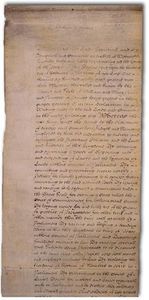English Bill of Rights
English Bill Of Rights

An Act Declaring the Rights and Liberties of the Subject and Settling the Succession of the Crown
The English Bill of Rights grew out of the Glorious Revolution of 1688. During the revolution King James II abdicated and fled from England. He was succeeded by his daughter, Mary, and her husband, William of Orange, a Dutch prince. Parliament proposed a Declaration of Rights and presented it to William and Mary on February 13, 1689. Only after they accepted the declaration did Parliament proclaim them king and queen of England. Parliament then added several clauses to the declaration and formally enacted the amended bill as the Bill of Rights on December 16, 1689.
The Bill of Rights combined past grievances against the deposed king with a more general statement of basic liberties. The statute prohibited the monarch from suspending laws or levying taxes or customs duties without Parliament's consent and prohibited the raising and maintaining of a standing army during peacetime. More importantly, it proclaimed fundamental liberties, including freedom of elections, freedom of debate in Parliament, and freedom from excessive bail and from cruel and unusual punishments. To prevent a recurrence of the religious divisions that beset the Catholic James in ruling a largely Protestant England, the Bill of Rights also barred Roman Catholics from the throne.
The Bill of Rights became one of the cornerstones of the unwritten English constitution. The Bill of Rights has also had a significant impact on U.S. law, with many of its provisions becoming part of the U.S. Constitution and Bill of Rights.
Additional topics
- English Law
- Emancipation Proclamation - Emancipation Proclamation
- English Bill of Rights - English Bill Of Rights
- Other Free Encyclopedias
Law Library - American Law and Legal InformationHistorical Legal Documents and Landmark Speeches